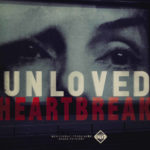If this review reads more like a love letter than a critical analysis then I sincerely make no apologies. I make no apologies not only due to the fact that we desperately need more love and less criticism, but because Low have elevated themselves to a level where any such mechanical appraisal feels like a waste of time. Never has this been the case more than their sold out performance at the Barbican Centre, a venue that is as beautiful and brutalist as Low are in their current guise.
Their performance is an extrapolation of the two key concepts that make the trio so irresistible; synergy and contrast. There is possibly no better venue in the country that suits them better, a grandiose hall with unrivaled acoustics that is at once expansive and yet at its core intimate.
The interplay of dual vocalists Alan and Mimi’s has these same qualities, particularly on ‘Tempest’ which when performed live is stripped of the crushing processing that swamps it on last year’s career highlight Double Negative and carried almost solely by their symphony of sorrowful sighs.
Then there is ‘Do You Know How To Waltz’, the bands longest and most intense song to date (and if Double Negative proved anything it is that “to date” is a necessary suffix to add to any summation of the band). Over the space of twelve minutes it grows into an enveloping wall of noise that garners obvious comparisons to My Bloody Valentine‘s ‘You Made Me Realise’, yet the droning three-chord riff that carries it has an almost meditative quality rather than being noise for the sake of noise.
This shift from light to dark, a shift made at numerous points throughout the set without one being completely divorced from the other, is more striking in the context of their stage show. For roughly 25 years of their 26 year career a stage show is something that Low have never given much thought to, but for this tour their use of three pillars of light in the middle of an otherwise pitch black stage adds another layer of intensity to their show, whilst also giving it a unifying theme.
Their days of picking a seemingly random selection of songs from their extensive back catalogue and opening up the encore to audience requests are seemingly over, and although that might not appeal to certain die-hards hoping to hear their personal favourites its certainly isn’t a detriment.
Low have always been a special band and one that were never going to be fully appreciated by merely consuming their recorded output, yet never has this been truer than it is today. That a band can exist for a quarter of a century and not only completely reinvent themselves but improve whilst doing so isn’t something that should be merely critically acclaimed; it should be celebrated.




